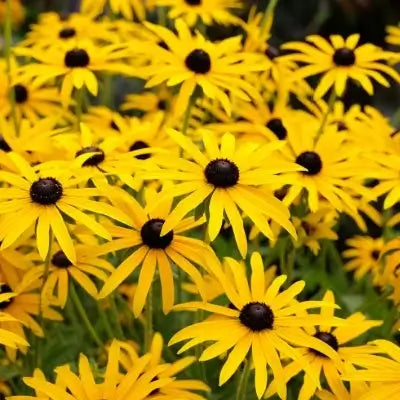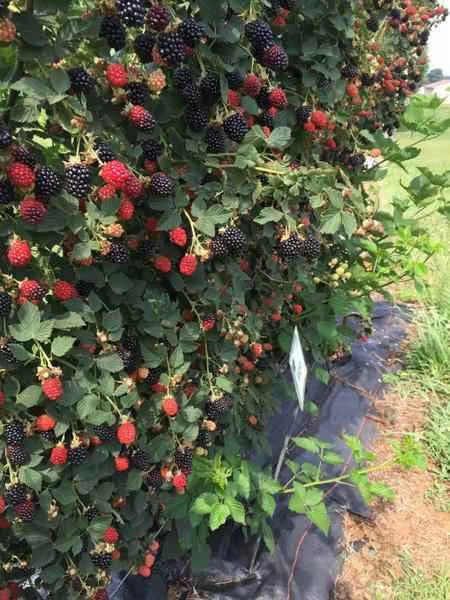
Perennials
Provides natural privacy and beauty
Low-maintenance and hardy growth
Attracts beneficial pollinators and wildlife
Thrives in
ZONE 3ZONE 4ZONE 5ZONE 6ZONE 7ZONE 8ZONE 9Planting Season:
Nov-AprilWild blackberry bushes, botanically known as Rubus Ursinus, are part of the bramble family, which includes roses. Our variety is the wild type that grows in the Tennessee mountains.
Although it’s native to North America, various species of this shrub can be found in South America, Europe, and Asia, growing wild in sunny areas alongside the edges of the woodlines.
The plant is considered a low-growing shrub that can reach a maximum height of five feet. Most bushes are between two and five feet tall, but they can reach widths of up to six feet.
These perennial shrubs are known for their climbing stems that develop hooked spines. The small, deciduous, compound leaves reach lengths of between one and three inches with three leaflets developing together.
The stems contain prickly barbs, making it part of the bramble family of bushes. Depending on the climate where they are planted, these bushes grow white flowers between April and May. In late summer, gardeners can expect these plants to produce berries.
Gardeners can enjoy planting them in any part of their yard that receives a lot of sunlight. Since they produce long stems or canes, it may be beneficial to include a trellis or something the bush can climb.
These bushes perform well around other flowers and shrubs. You can plant hyssop to create a focal point in your yard and discourage pests. If you want to ensure your yard attracts pollinators, consider planting borage and bee balm around your Rubus Ursinus bushes. Other plants that thrive around dewberry bushes include tansy, hazelnuts, and serviceberries.
Berry plants attract all manner of wildlife, who love to forage for pollen, berries, and seeds. Once you plant your Rubus bushes, you can expect to see lots of birds, including kingbirds, woodpigeons, finches, and sterlings.
These bushes also attract bumble bees, butterflies, red foxes, chipmunks and wild turkeys. Rubus bushes are renowned for their foliage, flowers, and berries. Gardeners can enjoy planting them and then watching the birds and bees that enter their yards.

Bloom Season
Spring
Bloom/Foliage Color
White
Height at Maturity
Under 10 Feet
Care
Water blackberry plants regularly, ensuring the soil remains moist but not soggy. Use mulch near the bottom to retain moisture and suppress weeds. Prune the plants annually to remove old canes and promote healthy growth. Fertilize with a level of fertilizer in earlier spring.
Shipping date depends on the date displayed and chosen when you order from the product's page.
We only accept returns on plants verified dead. If you think your plants have died, we offer a 1 year warranty, please use use this File a Claim Link to verify dead plants and start with return warranty process.




Space Efficient:
Many Blackberry Plants are bred for compact growth, making them suitable for smaller gardens or containers. They provide a productive and attractive option even in limited spaces.
High Yield:
Blackberry Plants produce an abundant crop of berries each season, ensuring you get plenty of fruit for your culinary needs and sharing with friends and family.
Nutritional Benefits:
Packed with vitamins, antioxidants, and dietary fiber, blackberries are a healthy addition to your diet. Growing your own ensures you have a fresh, nutritious snack right at your fingertips.
Seasonal Enjoyment:
Blackberries offer a summer harvest and can be preserved for year-round enjoyment. Savor the taste of summer even during the colder months with homemade preserves.
Caring Tips
Each box contains detailed care instructions and information about your product. But here's the basics.
Care Tips
Water blackberry plants regularly, ensuring the soil remains moist but not soggy. Use mulch near the bottom to retain moisture and suppress weeds. Prune the plants annually to remove old canes and promote healthy growth. Fertilize with a level of fertilizer in earlier spring.
Light Requirements
Blackberry plants thrive in full sun, requiring at least 6-8 hours of natural sunlight daily for optimal fruit production. While they can tolerate partial shade, reduced sunlight may result in fewer berries and smaller fruit size.
Hardy Planting Zones
3 • 4 • 5 • 6 • 7 • 8 • 9
How often should I water my plants?
How do I know if my plant is getting too much or too little sunlight?
What should I do to prepare my plants for winter?
What are the signs that my plant needs fertilizing?
How can I prevent pests from damaging my plants?
How do I choose the right plant for my climate zone?